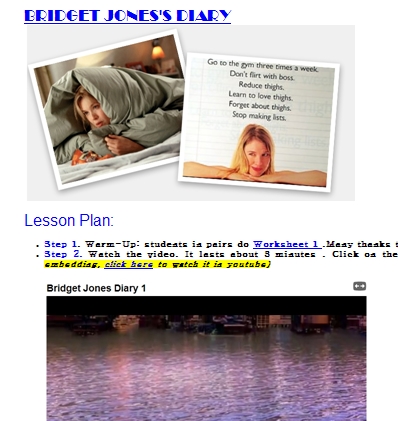Welcome back to my blog! How quickly time flies! Tomorrow I’ll be heading back to the classroom and I’m sure you will be too.
On the first day, it is not always easy to get started.  I’m never in the mood to start teaching straight away as some students have not bought their textbooks yet, you have some information to give, some forms to be filled ..etc, so I usually end up having less than half an hour to get them into the right mood for learning. That’s why I am considering using some of these activities from Online ESL Activities to help my students get rid of the dust accumulated during the summer holidays and give their English some brushing up.
I’m never in the mood to start teaching straight away as some students have not bought their textbooks yet, you have some information to give, some forms to be filled ..etc, so I usually end up having less than half an hour to get them into the right mood for learning. That’s why I am considering using some of these activities from Online ESL Activities to help my students get rid of the dust accumulated during the summer holidays and give their English some brushing up.
For elementary students:
3-6-9
This is a very popular Korean game. Students take turns to say numbers in order. The first student says, “1”, the second student says “2”, etc. Every time the digits 3, 6, or 9 appear, the student must clap once for each digit, not say the number.
So with the number “3”, the student must clap , not say “three!”. With the number “30”, the students must also clap once, and with the number “39” students must clap twice, because there are two instances of the digits 3, 6, and 9.
not say “three!”. With the number “30”, the students must also clap once, and with the number “39” students must clap twice, because there are two instances of the digits 3, 6, and 9.
If a student says a wrong number, claps at the wrong time, or says a number instead of clapping, they are out. Last person in the game wins.
As a variation, you can also include other rules for different numbers. For example, with multiples of 5, eg. 5, 10, 15, 20, etc. students must shout “A-Ja!”.
Alphabet Tic-Tac-Toe
Draw a 3×3 grid on the board. In each square of the grid, write a letter. Put the students into 2-4 teams. Each team selects a square, and must think of ten words beginning with the letter in the sqaure. Give them a time limit, for example 1 minute. If they  get 10 correct words, that team gets the square. The first with 3 in a row wins the game. With more teams use a 4×4 grid, teams have to get 3 or 4-in-a-row. Good for younger learners.
get 10 correct words, that team gets the square. The first with 3 in a row wins the game. With more teams use a 4×4 grid, teams have to get 3 or 4-in-a-row. Good for younger learners.
For intermediate classes:
Family Fortunes
Based on a popular British TV show. Put the students into two teams. The teacher should then think of a topic, and secretly write down 5 words connected with that topic. Teams take turns to guess the five words the teacher thought of.
For example, give the students the topic “Things you make spaghetti with”. Then jot down 5 connected words, eg. pasta, tomato, sauce, meat, herbs. The students in the first team take turns to guess the 5 words. If they guess them all correctly, they win. Otherwise the next team gets a chance. If both teams can’ t guess all 5 items, the team with the most correct guesses wins
Password
Split the class into teams. One student from each team comes to the front and faces away from the board. The teacher writes a word on the board. The teams must give definitions  to the team member at the front of the class. The first student to guess the word wins a point for their team.
to the team member at the front of the class. The first student to guess the word wins a point for their team.
As a variation, students can also be given three words which they cannot use in their definitions. For example, to define the word “rabbit”, you could disallow the words “ears”, “jump” and “carrot”.
Scattegories
Write a few categories on the board, eg. clothing, food, country, etc. Put the students into teams. The teacher gives a letter to a team and the students have to think of a word (or several words) starting with the given letter for each category. For example, imagine a class is using the example categories above and the letter “s”. Correct answers would include “shirt”, “salad”, and “Spain”. If a team gives a word for each category in under a minute, they get a point. The team with the most points wins
(or several words) starting with the given letter for each category. For example, imagine a class is using the example categories above and the letter “s”. Correct answers would include “shirt”, “salad”, and “Spain”. If a team gives a word for each category in under a minute, they get a point. The team with the most points wins
Spelling Bee
A student must start by saying a letter, eg. “d”. The next student must say another letter, eg. “a”. This student should know a word that starts with “da”. The next student says another letter, eg. “t”, and this student must know of a word that starts with “dat”. The next student says another letter, and so on.
Students may add letters even if they can’t think of a word, but this is dangerous. Every student, on their turn, can challenge the previous student about their spelling. If the previous student knows a word that uses all the letters given, the challenging student is out. If the previous student does not know a word, then the challenged student is out. Game continues until there is just one student left.



 I’m never in the mood to start teaching straight away as some students have not bought their textbooks yet, you have some information to give, some forms to be filled ..etc, so I usually end up having less than half an hour to get them into the right mood for learning. That’s why I am considering using some of these activities from
I’m never in the mood to start teaching straight away as some students have not bought their textbooks yet, you have some information to give, some forms to be filled ..etc, so I usually end up having less than half an hour to get them into the right mood for learning. That’s why I am considering using some of these activities from  not say “three!”. With the number “30”, the students must also clap once, and with the number “39” students must clap twice, because there are two instances of the digits 3, 6, and 9.
not say “three!”. With the number “30”, the students must also clap once, and with the number “39” students must clap twice, because there are two instances of the digits 3, 6, and 9.  get 10 correct words, that team gets the square. The first with 3 in a row wins the game. With more teams use a 4×4 grid, teams have to get 3 or 4-in-a-row. Good for younger learners.
get 10 correct words, that team gets the square. The first with 3 in a row wins the game. With more teams use a 4×4 grid, teams have to get 3 or 4-in-a-row. Good for younger learners. to the team member at the front of the class. The first student to guess the word wins a point for their team.
to the team member at the front of the class. The first student to guess the word wins a point for their team. (or several words) starting with the given letter for each category. For example, imagine a class is using the example categories above and the letter “s”. Correct answers would include “shirt”, “salad”, and “Spain”. If a team gives a word for each category in under a minute, they get a point. The team with the most points wins
(or several words) starting with the given letter for each category. For example, imagine a class is using the example categories above and the letter “s”. Correct answers would include “shirt”, “salad”, and “Spain”. If a team gives a word for each category in under a minute, they get a point. The team with the most points wins